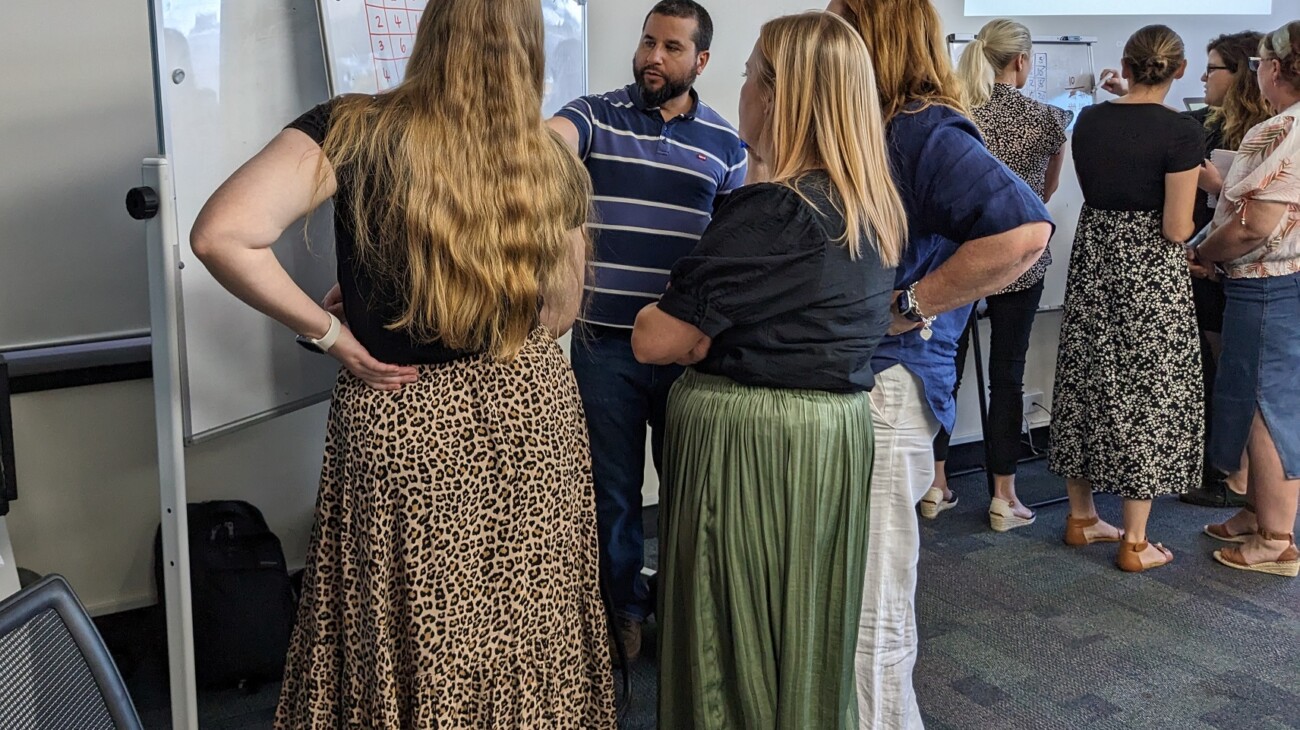Posted Friday, 11 July 2025
Wellard students build coding confidence
Students are building their skills in digital technologies, using pocket-sized computers to create everything from step …
Scitech Professional Learning Consultant and Lighthouse Maths Co-ordinator Shyam Drury writes about why the collaborative and social approach to maths through Powerful Problem-Solving is so impactful for teachers and students.

Imagine a mathematician. What comes to mind? Perhaps you imagine a bookish professor scribbling incomprehensible equations on a whiteboard. Now, imagine a maths class. Perhaps you think of rows of students diligently learning a procedure written on a whiteboard, working on their own on sheets of paper with lists of problems to practice.
This is the normal perception of mathematics in our society: a lonely, individual pursuit only accessible to a certain type of person. This is the perception that makes it okay to say to your child, “Don’t worry, I wasn’t a maths person either,” even though you would never dream of saying, “Don’t worry, I wasn’t good at reading either.”
Maths skills are essential
The truth is that maths underpins our modern world. We live in an information age where our lives are driven by algorithms based on mathematical equations that feed us suggestions for the next show to watch, song to listen to, or item to buy. Our government policies, education, health, and safety decisions are driven by data. It is no longer acceptable to just “not be a maths person.” Those who do not have a solid understanding of mathematics are severely disadvantaged in society, more susceptible to manipulation, and excluded from understanding how the most important decisions are made, and thereby making fully informed decisions for themselves.
Working together
Modern approaches to teaching mathematics focus on collaboration and discussion. I’ve been working for the last seven years promoting these approaches through programs like Lighthouse Maths. I have witnessed, repeatedly, the transformation that occurs in students, teachers, and classrooms, when the culture shifts to one of shared meaning-making. When students work together to solve problems, they learn not only from their teacher but from each other.
This collaborative approach is not just beneficial for students’ understanding of mathematics, but for their social and emotional development as well. By working with others, students learn how to communicate their ideas effectively, consider other perspectives, and develop problem-solving skills that are essential for success in any field. They learn how to listen to others, ask and answer questions, offer constructive feedback, and justify their reasoning. They learn to challenge each other respectfully and appreciate different perspectives. They become active learners, who are engaged and curious about the subject. This is a stark contrast to the traditional approach of rote learning and practicing isolated procedures. Mathematics is not just about finding the right answer, but about the journey of discovery, exploration, and problem-solving. And this journey is best taken with others. When students collaborate, they are more likely to persevere through difficult problems, as they support and encourage each other.
Mathematicians are collaborators
Professional mathematics is not a solitary pursuit. Mathematicians work in teams, collaborate on research projects, and share their ideas and discoveries with others. The stereotype of the lone genius mathematician who works in isolation is not accurate. In fact, many of the most significant breakthroughs in mathematics have been made by teams of researchers working together. But it’s not just mathematicians who need to collaborate. In our modern world, every field requires some level of mathematical understanding. Engineers, scientists, economists, social scientists, and even artists need to use mathematical concepts to solve problems and make decisions. By promoting collaboration and discussion in maths classes, we are preparing students for a future where mathematics is an essential tool for success, and mathematicians work with others from diverse fields to find solutions.
Maths is for everyone
Moreover, mathematics is not just a subject that is reserved for a select few individuals. Everyone has the potential to be good at mathematics, and we should work to remove the stigma that says otherwise. When we view mathematics as a social activity, we can create a more inclusive learning environment that encourages all students to participate and share their ideas. When we approach mathematics as a social activity, it becomes accessible to everyone. It becomes less intimidating and more relatable. We can learn from each other, and we can use mathematics to connect with others. It becomes a way to understand and appreciate diversity, as we learn to see problems from different perspectives.
Mathematics can also be a powerful tool for social justice. By promoting equitable access to maths education, we can empower individuals and communities that have been historically marginalized. When we create maths activities that are relevant to students’ lives and experiences, we can increase their engagement and interest in the subject. By encouraging diverse perspectives and ideas in maths discussions, we can broaden our understanding of the world and the problems we face.
So, the next time you think of mathematics, don’t just imagine a solitary figure scribbling equations on a whiteboard. Imagine a community of learners, collaborating and discussing ideas, and working together to solve problems and make the world a better place.
Find out more about Scitech’s Lighthouse Math program, supported by Chevron.
Upon clicking the "Book Now" or "Buy Gift Card" buttons a new window will open prompting contact information and payment details.